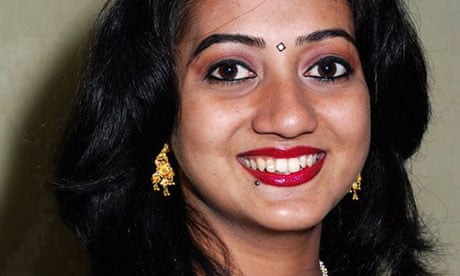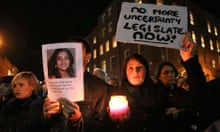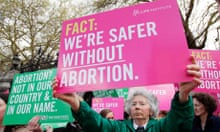Ireland's near-total ban on abortion has come under renewed scrutiny amid an outcry over the death of a woman who was denied a termination.
Savita Halappanavar, a 31-year-old dentist, died of blood poisoning at Galway University hospital. She had turned up at the hospital a week earlier, but was denied a medical termination and, according to her husband, was told: "This is a Catholic country."
The death intensified pressure on Ireland's Fine Gael-Labour coalition to legislate and create specific guidelines for medical staff on when abortions can be carried out. At present, abortions are permitted only if there is a "real and substantive" threat to a woman's life.
By coincidence, the Irish health minister, James Reilly, received an expert report on abortion guidelines yesterday. Enda Kenny, the Irish premier, said the two events should be separated. But Ruth Bowie from the group Terminations For Medical Reasons Ireland challenged Reilly to publish the report's findings.
"It is devastating to think that if Savita had been in another country she would probably be alive today," she said. "Does it take a death of a young innocent woman to finally make our government stand up and do something once and for all? The expert group report is long overdue, how long more do we have to wait? How many more tragedies are going to take place before action is taken?"
Halappanavar turned up at UHG on 21 October and was found to be miscarrying, but died of septicaemia a week later. She asked medical staff several times over three days to terminate the pregnancy.
Her family claimed medical staff denied her a termination because they detected a foetal heartbeat. They believe the delay in allowing her the termination caused blood poisoning and ultimately her death on 27 October.
Recounting her final days in UHG, her husband, Praveen Halappanavar, said: "Savita was really in agony. She was very upset, but she accepted she was losing the baby. When the consultant came on the ward rounds on Monday morning, Savita asked if they could not save the baby could they induce to end the pregnancy. The consultant said: 'As long as there is a foetal heartbeat we can't do anything.'
"Again on Tuesday morning, the ward rounds and the same discussion. The consultant said it was the law, that this is a Catholic country. Savita [an Indian Hindu] said: 'I am neither Irish nor Catholic', but they said there was nothing they could do.
"That evening, she developed shakes and shivering and she was vomiting. She went to use the toilet and she collapsed. There were big alarms and a doctor took blood and started her on antibiotics.
"The next morning I said she was so sick and asked again that they just end it, but they said they couldn't."
He recollected the moment he heard that medical staff were moving his wife into intensive care.
"They said they were shifting her to intensive care. Her heart and pulse were low, her temperature was high. She was sedated and critical, but stable. She stayed stable on Friday but by 7pm on Saturday they said her heart, kidneys and liver weren't functioning. She was critically ill. That night, we lost her."
Halappanavar's husband is back in south-west India after taking his wife's remains home. He is also looking after his wife's father, who fell critically ill after hearing about his daughter's death. However, the engineer with Galway-based company Boston Scientific vowed to return to Ireland and seek further answers.
Speaking on Irish radio, he said that on learning initially that his wife was pregnant the news had put both of them "on top of the world".
A spokesman for the hospital, which is part of a group of medical centres in western Ireland, said: "Galway Roscommon University Hospitals Group co-operates fully with coroners' inquests. In general, in the case of a maternal death, a number of procedures are followed, including a risk review of the case and the completion of a maternal death notification form.
"External experts are involved in the review and the family of the deceased are consulted on the terms of reference, are interviewed by the review team and given a copy of the final report."
Micheál Martin, the leader of the main opposition party, Fianna Fáil, used prime minister's questions in the Dáil to call for a separate inquiry by foreign experts into the tragedy.
Kenny said Reilly would review the new report into abortion and brief the European court of human rights on its findings, and its implications, by 30 November.
The Taoiseach said: "This is a tragic coincidence in the sense that the ABC report from the expert group has been received by the minister. People will inevitably put these two issues together where they are actually quite separate."
Ivana Bacik, a Labour member of Ireland's second parliamentary chamber, the Seanad, said the time was now right to clarify the law surrounding abortion in Ireland. Bacik, who has championed the cause of a woman's right to choose on abortion in Ireland and almost went to jail in the early 1990s for distributing abortion information about clinics in Britain, added: "I think there's a clear indication that governments' failure to legislate over a period of years is largely responsible for the uncertainty around the law."
Clare Daly MP of the United Left Alliance said the government bore responsibility for Halappanavar's death because they had rejected legislation proposed by her party in April intended to clarify the circumstances under which an abortion can be performed legally when the woman's life is at risk.
"A woman has died because Galway University hospital refused to perform an abortion needed to prevent serious risk to her life. This is a situation we were told would never arise. An unviable foetus – the woman was having a miscarriage – was given priority over the woman's life," said Daly.
Ireland's embassy in London was the focus on Wednesday for a demonstration by pro-choice activists, Irish expats and others calling for the Dublin government to legislate on abortion provision.
Among them were members the London-based Abortion Support Network (ASN), which provides economic support and accommodation for women seeking abortion in the UK, and which says that Irish women in financial distress were seeking its help in greater numbers.
"Our heart really goes out to the Halappanavar family for their tragic loss because, if reports are true, it was entirely preventable," said ASN's director, Mara Clarke. "We are really hoping that the public outpouring around this case will result in a much-needed change in the law in Ireland. We would like nothing more than for our services to be no longer required."
Also present was Christine Quiqley, a member of the British Labour Party, who said: "I'm here as an Irish woman living in Britain to show my concern at successive Irish governments' lack of action on abortion. It's absolutely unacceptable in the 21st century that Savita was allowed to die in an Irish hospital, despite Irish Medical Council guidelines that medical abortions can be accessed in Ireland if the mother's life is at risk.
"I'm also here to stand up for women in the Republic and in Northern Ireland who don't have access to this basic medical procedure. I want the government to legislate to clarify the law on abortion in Ireland, and to end the farce whereby we export the problem by forcing women to travel to the UK. It's time for Ireland to have a grown-up and sensible conversation about abortion."
Figures released in May by the Department of Health (DoH) showed the numbers of women from the Republic of Ireland travelling to England and Wales for abortions fell by 7% last year, but ASN says the number of women contacting it is set to double for the third year in a row.






